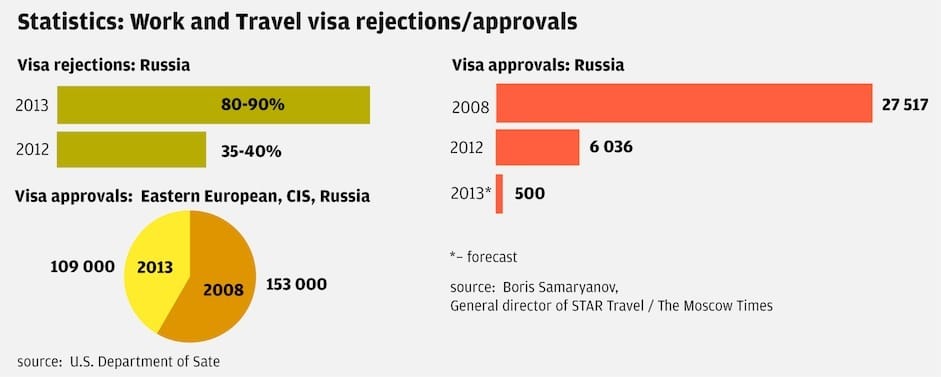US Summer Work Travel Program operating under tighter rules this year
The ability to travel to the US to work and gain experience – as well as be immersed in the culture of the country or a particular region or city – is a dream for many youth across the world. But that dream is becoming harder to achieve for some young foreign students. Late last year, the US State Department tightened restrictions for the issuance of J-1 visas, the visa necessary to be accepted in the US’s Summer Work Travel Program. According to the State Department, the tightening of J-I rules is aimed at ensuring the well-being of foreigners coming to the country under the visa. Indeed, there were reports over the last couple of years of J-1 visa recipients working in the US in unacceptable jobs and being used basically as low-wage workers. Most infamously, in 2011 foreign workers protested at a Pennsylvania factory where Hershey’s chocolates were packed. The New York Times summarised the protest like this:
“The students said they were forced to work on grueling production lines lifting heavy boxes, often on night shifts, isolated in the plant from any American workers. After paycheck deductions, the students said, they were paid so little they could not afford to travel in the United States, as the programme promised.”
The Hershey’s protest was not an isolated event: see, for example, a more recent incident outside of a McDonald’s restaurant. Working conditions such as those that have been the subject of protests were not anticipated by the designers of the five-year-old Summer Work and Travel Program – as the State Department has stressed in response to questions about tightening J-I visa rules beginning in 2011. The programme has brought approximately 100,000 foreign students to the US every year since it was launched to work for three months, then travel for a month. The admitted students are typically not from wealthy backgrounds, and American sponsoring agencies arrange for their trips and secure jobs and housing for them. The cultural component is meant to be as important as the work component. When incidents such as the Hershey’s factory protest occurred, the State Department realised it had to revisit the programme.
Current J1 rules
As ICEF Monitor reported last year, the State Department’s new J-1 rules bar international students from working in warehouse or packing jobs, on night shifts or in jobs the Labor Department has designated “hazardous to youth” (including jobs involving gambling, travelling fairs, massage or tattooing). They are also barred from mining, oil exploration, and most construction jobs. In addition, sponsors now have to let students know about specific cultural activities that will be available to them and review all jobs offered to students to make sure they are acceptable and able to give programme participants real interaction with Americans and American culture while they are in them. Furthermore, successful applicants to the J-I visa programme will be:
- Sufficiently proficient in English to successfully interact in an English-speaking environment;
- Post-secondary school students enroled in and actively pursuing a degree or other full-time course of study at an accredited classroom-based, post-secondary educational institution outside the United States;
- Finished at least one semester or equivalent of post-secondary academic study; and
- Pre-placed in a job prior to entry unless from a visa waiver country.
Too strict for too many students?
There have been complaints that the new J-1 visa rules are too stringent, and that they are provoking too many rejections of foreign students.
For example, Russian news sources have reported that 80 to 90% of the Russian students who have applied for J-1 visas to participate in the US government’s Summer Work Travel Program since mid-March have been rejected.

“Our most important priority is the security, health and well-being of people who come for a summer to travel and work. We have to put on some more difficult restrictions because we were finding in some cases that we are not able to deliver a highest possible quality. Any time when an international visitor comes to the United States, it has to be a positive experience. If it is negative in any way, it is going to be hard for everyone.”
Tight but fair?
It is hard to argue with the argument put forth by Ms Sonenshine. The US is the leading study abroad nation in the world, and it does have to protect both its image as a top-notch destination and the students who come to work, study, and travel there. However, the gradual tightening of J-1 rules is part of a larger trend of increasing scrutiny of immigrant visas in the US that may make the country less competitive relative to other countries – at least for students who are not notably exceptional or desirable in the American work force. But accepting and protecting only the most genuine, promising students at the expense of overall enrolment numbers may be a balance the US is prepared to take. American schools, colleges, and universities will be watching the trend with interest, as they contend with the paradox of stricter immigration policies and increased need for foreign enrolments.
















